|
“What is man that you are mindful of him or the son of man that you are for him?” Ps. 8:4 In a time such as this, in the middle of a worldwide pandemic, many people are tempted to ask questions: Why is this happening Lord? What will become of me? Have you forsaken us? Do you still care for us? As Catholics, we need only to search the holy scriptures to find our answers. Isaiah 41:10-13 says “For I am the Lord, your God, who takes hold of your hand and says to you, do not fear, for I am with you; be not dismayed, for I am your God, I will strengthen you, I will help you, I will uphold you with my victorious hand.” In the midst of overwhelming craziness, staring down the face of so many unknowns, this verse gives me such comfort! I read it and remember the Israelites wandering in the desert for a very long time, not knowing how or when they were going to be delivered to the Promised Land, and it puts this situation in better perspective. From history, these people were fed and their needs provided for because God promised He would help them. I do not need to know when this specific disease will be eliminated. I do not need to know how long my ‘normal life’ will be turned upside down. I do not need to worry if my basic needs will be provided for. I have a promise from the Almighty. His promise is unbreakable and everlasting. So where does my anxiety come from? It comes from not leaning on His strength, not trusting in His provision, not resting in His perfect love. I need to spend my time praising and thanking Him for the fact that He cares about every minute detail of my life and has told me He will not abandon me – unequivocally! Upon my rising, I must choose to be grateful for another day to live in service of my husband, my children, and my neighbors. When I begin in gratitude, I can step forward into the day with all it’s uncertainties and live in peace, not in fear. “Cast all your anxiety on him because he cares for you.” 1 Peter 5:7 When I recall that God cares for each of us with a love that is perfect, this knowledge begins to settle in my heart and permeates my soul. It is an act of surrender – to cast my human weaknesses on Him and go about the duties of my day with a disposition of peace and hope. St. Paul reminds us in 2 Timothy 1:7: “For the spirit God gives us does not make us timid, but gives us peace, love and self-discipline.” This applies to all of us – not just the people in Ephesus a couple thousand years ago! God’s love is timeless, limitless, and eternal. It is beyond our human comprehension. It requires us to choose to believe and experience Christ’s love within us. You see, we have more important things to be doing than spending our time questioning, worrying, wondering, lamenting, and fearing. He reassures us over and over that He is near, is helping us, and is carrying us. We have evidence of His care for us in the many selfless people on the front lines serving our medical needs, manning our stores, and delivering our supplies. They are God’s love made manifest in this crisis. It is our choice to decide that we will believe this and trust moment by moment that His promise is true and secure. We don’t have to fully understand it – because we won’t – but in order to live in serenity with a calm mind, we must choose to walk in complete belief. We can accomplish this amidst great trial, because He is our helper and our strength, our strong tower. As we live in the disposition of faith that God will care for us in all circumstances, we can reach out to those around us and share this magnificent gift. We can be His hands, His voice, or His smile to quell the fear in another. This is our call as Christians – to wholeheartedly believe and to unconditionally share it with everyone. It seems so simple. And it is – when we devote ourselves to prayer and fasting and Scripture reading. We are afforded so many wonderful ways to do these. We have our Bibles in book form, on our tablets and phones. We can stream Masses being offered in churches all over the world right from our couches. There are numerous holy men and women who speak and write about God’s promises that we can listen to or read. In our progressive digital age, it is amazingly easy to immerse ourselves in material that will strengthen our belief and encourage us in the truth of God’s care for us. How fortunate we are! We can go about our days, in the middle of great strife, with confidence that God is mindful of us, each and every one of us. “Whoever trusts in the Lord is kept safe.” Proverbs 29:25 Still, because I am just a mere mortal with lots of frailties that can derail me from the Godly path, I keep reminders on the walls of my home to keep me focused on this truth. A wooden sign that reads ‘Expect a Miracle’ hangs in my family room. The Good Shepherd cradling a sheep hangs in my dining room. Pictures of the Sacred Heart of Jesus and the Immaculate Heart of Mary hang over my bed. The face of Jesus hangs in my living room. Crucifixes hang in every room. These are my personal visual reminders of the love of God that help me keep my eyes on Him, my heart comforted, and my mind at peace. I recommend everyone find tangible ways to stay connected to this truth so that we can be disposed to share it with others. It is when I live from this mindset that I can sing with total confidence that it is well, it is well with my soul! “Consider it pure joy, whenever you face trials of many kinds, because you know that the testing of your faith develops perseverance. Perseverance must finish its work so that you may be mature and complete, not lacking anything. If any of you lacks wisdom, he should ask God, who gives generously to all without finding fault, and it will be given to him. But when he asks, he must BELIEVE and not doubt.” James 1:1-8 Who are we that God cares for us? We are His. He thought us into being because He is love and He wants to share His love with us for time and eternity. That is a comfort and a confidence I can rest in! This is the Savior who is mindful of me. Thank you, Lord! Continue to shower me with the grace to walk steadfast in my belief. No matter the trials or circumstances, God is with us and all will be well.
0 Comments
In today’s Gospel, Jesus turns to Peter saying, “Blessed are you, Simon son of Jonah. For flesh and blood has not revealed this to you, but my heavenly Father. And so I say to you, you are Peter, and upon this rock I will build my Church…” On the Sea of Galilee, Peter is marked as the shepherd of the Church. He began as Simon son of Jonah, an unlikely character, a fisherman. Now he will be the leader of the followers of Christ. As the Catechism of the Catholic Church states, “[Jesus] gave him the keys of his Church and instituted him shepherd of the whole flock.” We celebrate this sublime moment today on the Feast of the Chair of St. Peter, praying in a special way for the pope—St. Peter’s successor—and also all clergy, bishops, priests, and deacons who continue to shepherd Christ’s flock. Why celebrate a chair? The physical Chair of Peter is fixed in the Basilica of St. Peter in Rome, but it is a physical symbol that communicates a spiritual reality. Pope Emeritus Benedict gave a concise homily on its significance in 2006, explaining that each bishop sat on a cathedra (his established seat) when entrusted with a specific church. It was not only the place Peter would have sat as bishop, but also where he would have taught, preached, and carried out his priestly tasks. Peter once held a physical space, much like a solitary shepherd who stands with his staff and provides for the sheep he serves. And over time, the chair has been broken, worn, and recreated as a symbol of the apostle’s works. As Peter went from Simon to the rock, petra, the chair became cathedra, the bishop’s seat. Pope Benedict XVI continued in his homily, “the Chair of the Bishop of Rome represents not only his service to the Roman community but also his mission as guide of the entire People of God.” The Chair of St. Peter, therefore, points to the Eternal Good Shepherd: Christ himself. Jesus instituted the papacy knowing of Peter and his future successors’ humanity. Peter was passionate, dramatic, foolish and courageous. He both loved and held a deep respect for Jesus, but would later betray his friend during his Passion. Yet Peter was also the first of the apostles to profess: “You are the Christ, the Son of the living God” (Matthew 16:16). It is for this reason that Jesus replied to him, “you are Peter, and upon this rock I will build my Church.” God works within the brokenness of our humanity and invites us to sanctity, just as he did with Peter. Peter went from a man who betrayed Christ to a martyr who died for him. As the first pope, he became a great leader and model despite his human imperfection. In addition to the humanity of Peter, the Chair also reminds us of the call to holy leadership and is a sign of the grace given by God to those whom he calls, especially in the Sacrament of Holy Orders. The Catechism states, “Just as ‘by the Lord's institution, St. Peter and the rest of the apostles constitute a single apostolic college, so in like fashion the Roman Pontiff, Peter's successor, and the bishops, the successors of the apostles, are related with and united to one another." On this Feast, let us remember to pray for our pope and for all our church leaders! How can celebrating the Feast of the Chair of St. Peter impact our own lives? Think of the physical and spiritual chairs that you sit in today and each day. Whether in an office, at home, in church, or outside, a chair enables us to perform our daily functions. In the same way, we hold offices in our lives. From being a young professional, mother or father, administrator, businesswoman or postman, we hold a place in this world as Christ’s followers. What chair is Christ asking you to fill in his Church? In his homily on this Feast Day in 2016, Pope Francis challenged the Curia and all the Church to make Peter’s words their own. He said, “May our thought and our gaze be fixed on Jesus Christ, beginning and end of every action of the Church…Christ is the rock, on whose foundation Peter was also built…He is the ‘rock’ on which we must build.” As we celebrate the Feast of the Chair of St. Peter, let us ask for St. Peter’s intercession as we strive to profess with faith, “You are the Christ, the Son of the living God.” Reflection Questions: What are the “holy offices” you hold in your own life? How do they reflect the great call of St. Peter as rock of the Church? Take time today to pray a prayer for priests in honor of St. Peter. A man named John was sent from God. He came for testimony, to testify to the light, so that all might believe through him. (John 1:6-8)
The first word that comes to mind upon reading this Gospel is humility. In response to questions from the priests and Levites, John explains that he baptizes not as Christ, Elijah, or the Prophet, but as “the voice of one crying out in the desert, ‘make straight the way of the Lord’.” John is so quick to point out this distinction, so quick to give credit where he feels credit is due. Reflecting back to my years of service as a Lasallian Volunteer and Good Shepherd Volunteer, I think I could have used a slice of this humble pie. How often did I consider myself “the light,” taking on the responsibility to serve, or save, the communities I entered? How often did I fail to see the parts of myself that needed saving, and that this saving work was never really mine to begin with? Thanks to time, perspective, and most of all, the grace of God and those I have encountered, I continue to be humbled - moved beyond my self-righteousness, and into a space of more authentic listening, learning, and loving. These moments, in all their discomfort and vulnerability, become my testimony; through the gift of growth, I can “testify to the light.” Focus on: COMMUNITY In this Gospel, the questions posed by John’s community invite him to name who he is and what he is about. Community often provides this challenge and gift - holding a mirror up to our past, present, and future and reflecting how all these complexities meld and meet the world. How do your communities help you own your truth? In community, how can we help each other “testify to the light” within? SERVICE SUGGESTION: Spend some time reflecting upon someone in your community who has helped you grow more into who you aspire to be. Write a note of appreciation, take them out to coffee, or find some unique way to affirm them and acknowledge the influence they have had. PRAYER: Our Power to Bless One Another by John O'Donohue (Excerpt from To Bless the Space Between Us) In the parched deserts of post-modernity a blessing can be like the discovery of a fresh well. It would be lovely if we could rediscover our power to bless one another. I believe each of us can bless. When a blessing is invoked, it changes the atmosphere. Some of the plenitude flows into our hearts from the invisible neighborhood of loving kindness. In the light and reverence of blessing, a person or situation becomes illuminated in a completely new way. In a dead wall a new window opens, in dense darkness a path starts to glimmer, and into a broken heart healing falls like morning dew. It is ironic that so often we continue to live like paupers though our inheritance of spirit is so vast. The quiet eternal that dwells in our souls is silent and subtle; in the activity of blessing it emerges to embrace and nurture us. Let us begin to learn how to bless one another. Whenever you give a blessing, a blessing returns to enfold you. *This post was published in the 2017 Advent Reflection Guide, a collaborative effort between the Catholic Volunteer Network and the Catholic Apostolate Center. Click here to view the full guide. Katie Delaney is a former Lasallian Volunteer and former Good Shepherd Volunteer. To learn more about faith-based service opportunities through the Catholic Volunteer Network, please click here. Have you ever been called frail before? I was once by a priest in a homily; the word was unsettling. As the priest slowly enunciated the words, “You. Are. Frail” a flood of various thoughts rushed over me. Mainly, I was proudly scoffing and thinking, “I’ve got this. I have my spiritual life together. I mean, I am one of the few Catholics that goes to Mass every Sunday…That says something, right?”
Frailty. The word itself seems weak, puny. In reality, those thoughts of mine, the “Oh I got this” or the “I’m not doing so bad”—don’t they reveal my frailty, my weakness? They reflect a mindset rooted in pride that doesn’t think that I need Him. Perhaps more unsettling are Paul’s words to the Corinthians. Paul writes about begging God to remove a thorn in his flesh, to which God replies, “My power is made perfect in weakness.” Paul continues in his Letter, “I will all the more gladly boast of my weakness, that the power of Christ may rest upon me. For the sake of Christ, then, I am content with weaknesses, insults, hardships, persecutions and calamities; for when I am weak, then I am strong!” Doesn’t the world tell us that we need to have our act together—the complete opposite of Paul’s words above? Why would we boast in the things we are not good at? The saints are saints because they know they are weak sinners, and yet they never became complacent. They boasted in their weakness while asking God for the grace and love to grow in the midst of it and didn’t attempt things on their own. They were receptive to the Lord’s guidance, His divinity. Our Holy Father, Pope Francis, also exhibited this “boasting” at the beginning of his papacy when he said, “I am a sinner…but I trust in the infinite mercy and patience of our Lord Jesus Christ.” In Scripture, we are compared very often to sheep. Sheep need the shepherd to survive. They have been known to graze on the same grassy area, gnaw the grass to its root, which kills the grass, and eventually starve themselves to death due to the lack of nutrition. The shepherd must therefore guide the sheep for survival. Jesus, the Good Shepherd, guides us. Will we let him or will be remain complacent? The real problem that I encountered in the pew that Sunday was this complacency. Like the sheep, I was gnawing at the same grassy area, stubbornly thinking I was getting the nutrients and food I needed. I, like Pope Francis, must recognize that I am a sinner—that I am frail and I need Him. Only this will allow me to boast in my weakness. When I acknowledge that I am weak, I am acknowledging my need for Him evermore. When I acknowledge my dependence on Him, He then can give me the strength I need to make it through the day—to accept His Love in my human limitations. If we are to journey on the beautifully romantic and stretching road to holiness, we must be careful of feeling too comfortable while gnawing the same patch of grass. Instead, we are called to boast in our weakness and invite the Lord to move in us, to change us. Change and growth are uncomfortable, but necessary to the Christian life. For we are frail, and yet we boast in the sheepishness—knowing our Shepherd is strengthening and guiding us along the path. The quickest and surest way to be led by the Good Shepherd is by letting Him consume us in the Holy Eucharist. There, we are united with our Shepherd, held in His gentle and loving arms close to His Sacred Heart through the good and the bad. There, we will find true comfort, there we will be able to join St. Paul and see our frailty turned into true strength! Elizabeth Pawelek is pursuing her Master's in Leadership for the New Evangelization at the Augustine Institute in Denver, Colorado. On October 8, 2013, Pope Francis announced that in October 2014 there would be an Extraordinary General Assembly of the Synod of Bishops on topics related to the family and evangelization. A year later, more than 250 participants, including 14 married couples from around the world, gathered in Rome to find ways to improve the pastoral application of church teachings, ways to explain it, and to help Catholics live it. The goal of this synod was not to reach definitive conclusions but rather set the agenda for a larger world synod in October 2015. Until then, the 185 bishops in attendance would share what was discussed in the Synod with their respective dioceses in preparation for implementation before sharing their experiences with and making recommendations to the Holy Father.
It is on such an occasion that we reflect on the office of the bishop, men who are “endowed with the authority of Christ” by virtue of apostolic succession to “exercise their pastoral office over the portion of the People of God assigned to them” (CCC 888, 886, cf. 2 Timothy 2:2). These men are much more than diocesan administrators of the Church— by virtue of their identities as the successors of the Apostles, they wield the same power and authority to govern the universal Church as that given to their predecessors by Christ. Together, with the Bishop of Rome (the successor of Peter), and assisted by priests and deacons, the college or body of bishops tend to their local Churches; by ruling them well, each bishop contributes “to the welfare of the whole Mystical Body, which, from another point of view, is a corporate body of Churches” (CCC 884-886). The role of the bishop is threefold: to teach, to govern, and to sanctify. With priests as co-workers, the bishop’s first task is “‘to preach the Gospel of God to all men,’ in keeping with the Lord’s command” (CCC 888). In order to preserve the purity of the Faith first entrusted to the Apostles, Christ extends a share in His own infallibility to the bishops of the Church who are working in communion with the Pope (CCC 890). This Magisterium, then, is tasked with overseeing the spread of the Gospel and addressing any misunderstandings regarding the Church’s dogma; in matters of faith and morals, the extraordinary Magisterium is infallible, particularly when assembled in an Ecumenical Council or proposing a doctrine “for belief as being divinely revealed” (CCC 891). Secondly, each bishop governs his local Church (i.e. diocese) by his counsels, exhortations, and example. Though he has authority and sacred power, the bishop exercises them— in communion with the whole Church and under the guidance of the Pope— in a spirit of service to those entrusted to his care as well as the rest of Holy Mother Church (CCC 895). Finally, the bishop, “the steward of grace of the supreme priesthood,” along with the priests, sanctifies the Church through his “prayer and work, by [his] ministry of the word and of the sacraments” (CCC 893). By his example, the bishop helps his entrusted flock attain eternal life. Just as our Lord is the often portrayed as the model shepherd, the bishop, like the “Good Shepherd,” must lead his faithful flock along the path of salvation, disciplining and protecting them as needed. To set them apart from other religious, bishops utilize special regalia distinctive to their Office, that is, the fullness of the Sacrament of Holy Orders: the pectoral cross, ring, the zucchetto and miter (hat), crozier (staff), and pallium. The cross, traditionally containing a relic, is attached to a chain and is worn on the chest. The ring symbolizes the bishop’s authority and traditionally is reverenced by kissing. The miter, unlike the zucchetto, is worn purely for liturgical functions and is referenced in Scripture as a headdress for the Judaic (high) priesthood (see Exodus 39:27-31; cf. Leviticus 8:7-9). The crozier clearly references the model Good Shepherd and symbolizes guidance, correction, and support. Finally, the pallium, normally reserved for metropolitan archbishops and the Holy Father, represents fidelity to Christ. These different regalia give a certain distinction to and inspire respect for the Office of Bishop and its authority. Let us never forget about our bishops! As leaders of the Church, these men are always in need of our prayers! As Blessed Pope Paul VI said when setting up the first Synod of Bishops in 1965, bishops assist in providing for the good of the universal Church through “the consolation of their presence, the help of their wisdom and experience, the support of their counsel, and the voice of their authority.” May we always follow these men who continuously defend and guide the Church in the spirit of the Apostles. Thomas Wong is an undergraduate at The Catholic University of America in Washington, D.C. |
Details
Archives
July 2024
Categories
All
|
About |
Media |
© COPYRIGHT 2024 | ALL RIGHTS RESERVED

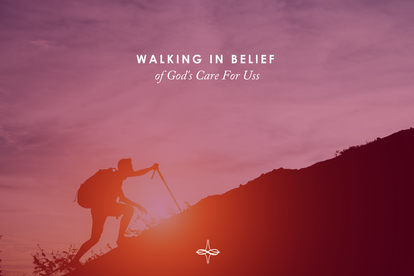

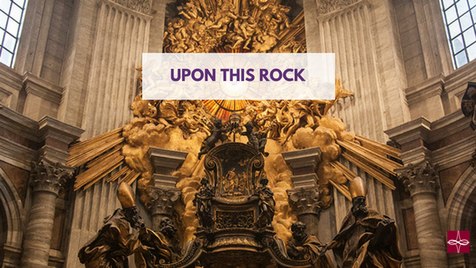

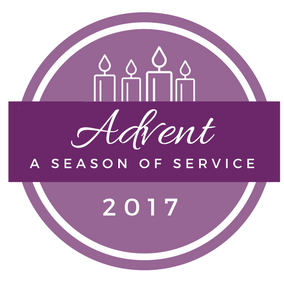
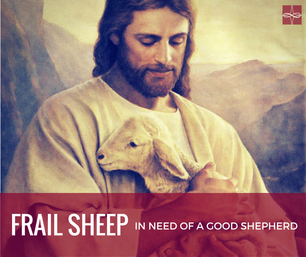
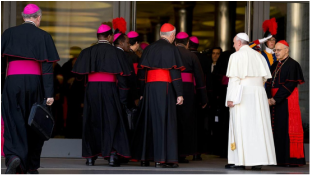
 RSS Feed
RSS Feed